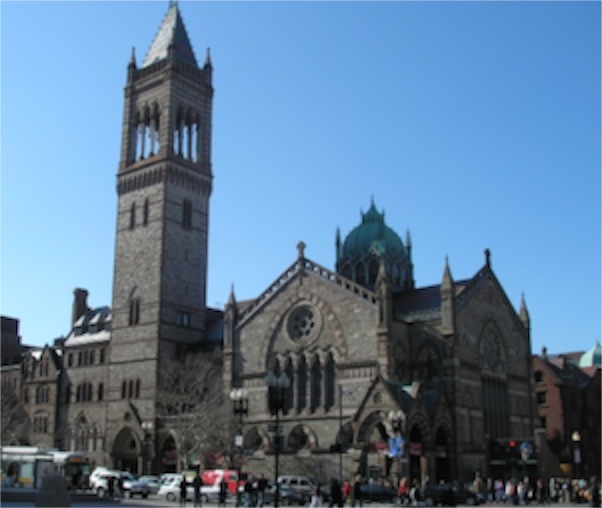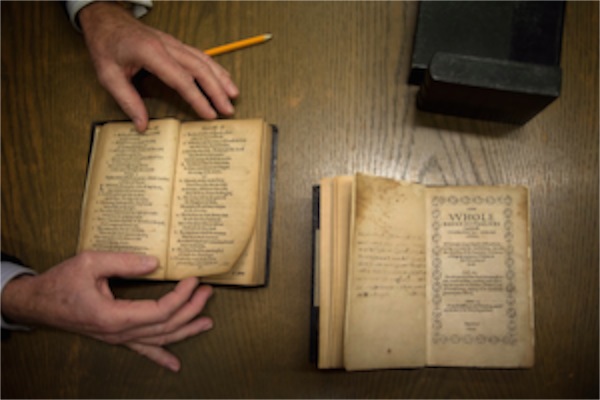Selling History
26/12/12 04:56

It was Old South where Benjamin Franklin was baptized. Old South was the meeting place of the Sons of Liberty and the planning of what has become known as the Boston Tea Party. In many ways the congregation has a role in our story that reaches far beyond the city of Boston. It is a part of our shared history.
So we took notice when a friend and colleague with whom we had shared ministries in Boise, became the Senior Minister of the iconic congregation. Rev. Nancy Taylor has had a stellar career in the ministry and came to Old South from the position of the Conference Minister of the Massachusetts Conference.
Old South gains its name from its meetinghouse. The congregation’s first building was known as the Cedar Meeting House. The current home of the congregation is sometimes known as the “New” Old South Church. It is an unusually ornate building for a Congregational Church. Completed in 1875, it has a tall bell tower, a roof of red and black slate tiles, and a copper cupola. It is filled with carvings and ornamentations.
Old South is a stable landmark in the story of our church. But it is also a growing and exciting congregation, often identified as one of the places of “best practices” among the ministries of our denomination.
Recently the congregation made a gut-wrenching decision that got my attention. I don’t know whether or not it is the right decision for the congregation, but it wasn’t mine to make. The vote was not particularly close. 271 members voted “yes” while only 34 voted “no.” What they voted to do was to sell one of the two copies of the Bay Psalm Book that the congregation owns. There are only 11 copies of the book in existence. Old South owns two copies. The book is expected to bring between 10 and 20 million dollars at auction.
The congregation does need money. The building is now more than 135 years old and there is about $7 million in deferred maintenance that needs to be done. Despite a growing membership, the costs of maintaining the old building are extremely high and beyond the means of the congregation. In the past, a congregation like Old South would abandon the old building and start over. But that is not easily done. The building is on the National Register of Historic Buildings. Some changes are subject to approval by governmental authorities. Razing the building and starting over is out of the question.
So do you sell your history in order to support the history that remains? To put the question in another context, what right does any generation have to cash in on its legacy? The things inherited from previous generations do belong to the current generation, but which things should be passed on to the next generation? I know it isn’t an easy question.

I mourn the decline of the press. I mourn the decision to sell the book. But that does not mean that it wasn’t the right decision.
Rev. Taylor, at least in her public statements, seems to have little or no hesitation about selling the book. “I adore and cherish this congregation’s history. We collect up these stories and carry them with us, but we don’t have to carry the book with us . . . in order to learn from it, to be inspired by it, to be made brave by it.” I’ll grant her that much – it takes courage to sell historical artifacts to fund current operations. On the other hand a decision to refuse to sell artifacts would have been no less courageous. The church’s historian, Jeff Makholm spoke for the minority when he said, “We think it is disgusting. It’s breaking faith with the people who poured their energies into keeping them safe as a representation of history.”
The controversy will continue. It may be one of the marks of the ministry of Rev. Taylor. It will be part of the story of our generation. Each generation is faced with the dilemma of sorting the artifacts of the past.
There is much of the past that is being lost. I hope and pray that we will never become cavalier with our decisions about what to keep and what to release. I’ve never been a member of Old South Church. I have no say in the decisions of the congregation. Still, it feels like they’re putting our family treasures up for sale. I, for one, have no intention of watching the auction. Even if it is the right decision it will be a sad day.